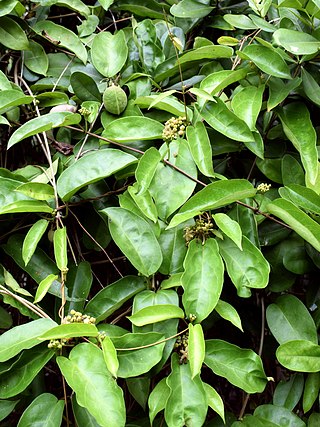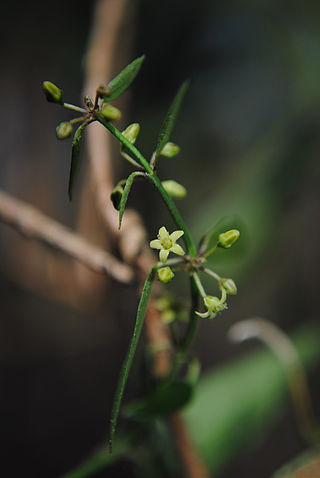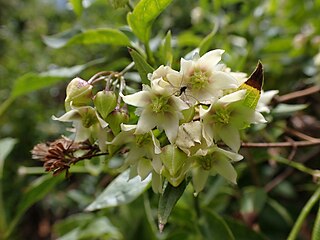
The Asclepiadoideae are a subfamily of plants in the family Apocynaceae. Formerly, they were treated as a separate family under the name Asclepiadaceae, e.g. by APG II, and known as the milkweed family.

Cynanchum is a genus of about 300 species including some swallowworts, belonging to the family Apocynaceae. The taxon name comes from Greek kynos and anchein, hence the common name for several species is dog-strangling vine. Most species are non-succulent climbers or twiners. There is some evidence of toxicity.

Stephanotis is a genus of flowering plants first described in 1806. The name derives from the Greek stephanōtís fit for a crown, derivative of stéphanos (masculine) crown. It contains evergreen, woody-stemmed lianas with a scattered distribution in several tropical and subtropical regions.

Vincetoxicum is a genus of plants in the family Apocynaceae. Although the species in Vincetoxicum have sometimes been included in Cynanchum, chemical and molecular evidence shows that Vincetoxicum is more closely related to Tylophora, now included in Vincetoxicum. The generic name means "poison-beater" in Botanical Latin because of the plants' supposed antidotal effects against snakebite.

Sarcolobus is a plant genus in the family Apocynaceae, first established as a genus in 1809. It is native from Bangladesh through Southeast Asia, to New Guinea, Australia, and certain islands of the Western Pacific.

Funastrum is a genus of flowering plant now in the family Apocynaceae. The name is derived from the Latin word funis, meaning "rope", and astrum, alluding to the twining stems. Members of the genus are commonly known as twinevines.

Rauvolfioideae is a subfamily of the flowering plant family Apocynaceae. Many species are woody lianas, others are shrubs or perennial herbs.

Periplocoideae is a subfamily of the dogbane plant family, Apocynaceae. It was not divided into tribes as of 2014.

Orthosia is a genus of plants in the family Apocynaceae, first described as a genus in 1844.
Tassadia is a genus of plants in the family Apocynaceae, first described as a genus in 1844. It is native primarily to South America, with one species extending north into Central America, S Mexico, and Trinidad.

Philibertia is a genus of flowering plants in the family Apocynaceae, first described as a genus in 1819. It is native to South America.

Jobinia is a genus of flowering plants of the family Apocynaceae first described in 1885. It is native to South America and Central America.
Pentacyphus is a genus of plants in the family Apocynaceae, first described as a genus in 1906. It is native to South America.
Anemotrochus is a genus of flowering plants belonging to the family Apocynaceae.

Ruehssia is a genus of plants in the family Apocynaceae. It is also in the Asclepiadoideae subfamily and Marsdenieae tribe.

Leichhardtia is a genus of flowering plants in the dogbane family (Apocynaceae). It includes 85 species native to mainland Australia, Papuasia, New Caledonia, and Lord Howe Island.
Gongronemopsis is a genus of flowering plants in the dogbane family, Apocynaceae. It includes nine species native to tropical Africa and Madagascar, the Indian subcontinent, Indochina, southern China, and the Philippines.
Achilleanthus is a genus of flowering plants in family Rubiaceae. It includes seven species native to the Lesser Sunda Islands, New Guinea, and the southwest Pacific.












